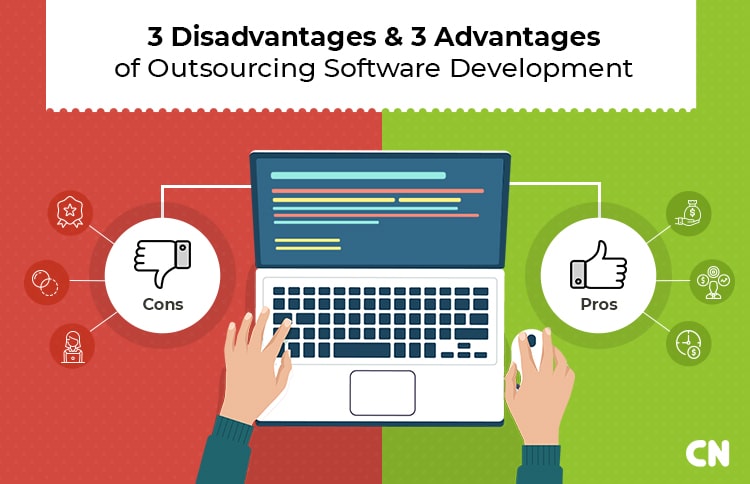3 Disadvantages and 3 Advantages of Outsourcing Software Development
Table of Contents
Everyone knows the advantages of outsourcing development — especially speed and lower costs…
But do you also know the hidden disadvantages?
Some outsourcing agencies still have problems ensuring quality and streamlining project management. Avoid these, because they could cause delays and complications which destroy any of outsourcing’s main advantages.
But on the other hand, outsourcing can be an excellent way to build products, add to your skillset, offer new services, and supplement the effectiveness of your core team.
Is outsourcing the right choice for you? Absolutely… but you also need to be crystal clear about the “cons” of outsourcing as well as the pros.
Because some agencies try to paint an unrealistic picture of the benefits of outsourcing without properly communicating any of the drawbacks, we decided to write this article and give you the truth.
If you want a detailed overview of both the pros and the cons, then read on…
Cons of Outsourcing

Let’s face it… outsourcing has its disadvantages.
You can mitigate most of them by taking your time to vet and research your remote partners and ensuring clear communication. (A surprising amount of issues can be solved this way). However, not everyone takes the time to do so.
The biggest concerns people have are quality, communication, and transparency… but did you know that another issue is the effect outsourcing has on company morale?
You can solve these issues before they become a problem, if you make communication and accountability your main focus.
Some issues, however, simply stem from the nature of outsourcing and you’re going to have to figure out how to overcome them.
So, onward…
1 – Uneven Quality
This is probably the #1 concern for people thinking about outsourcing. Distance can makes it feel like quality is out of your control… after all, it’s much easier to feel “in control” of someone who works in an office next to you.
But in fact, ensuring quality is not that difficult when outsourcing.
The key, of course, is to pick a reputable outsourcing partner that has a track record of delivering quality work. Ask to look at a portfolio. Better yet, you can request a consultation and speak with the leadership face-to-face.
You can even try a small test project to see what working together will be like — in some instances some agencies, such as Capital Numbers, might even give you several weeks worth of work at no cost so you can see if you’re a fit.
But ensuring quality is an ongoing process and has a lot to do with transparency and communication. So let’s address those next…
2 – Communication & Transparency
If you want your remote team to be honest and open with you, you’ll need to be honest and open with them.
First, lay the foundations of communication. You can start by suggesting a project management and communication platform, asking for a consultation, and clarifying when you want check ins. (You may only want updates once a week, or you might want a short email at the beginning and end of every workday. It’s up to you).
Your remote partner will be happy to meet your needs, because it’s in their best interests to do so. They want to do exactly what you need so you pay on time and come back to them for future work. And you, of course want a high-quality product, delivered on time, to specifications.
So facilitating clear communication and transparency works to the advantage of both parties.
3 – Your In-House Employees
Once you start trusting your work to remote development, you realize quickly that most tasks can be done quicker and less expensively by remote workers, rather than in-house employees.
This presents a problem. Will you allow your in-house employees to eat up the budget even though it will be more efficient to outsource their tasks? Or can they be replaced?
It may be best to retain a core group of highly skilled and highly professional in-house employees for your most important skills, and outsource all the rest.
But the question remains: if you start outsourcing, will any of your employees feel threatened because they think their jobs are at stake? Will they resent you if you lay off some of them?
You might want to weight these considerations before you start.
Pros of Outsourcing

Don’t let the above section give you the impression that outsourcing is disadvantageous. Quite the opposite, in fact. Outsourcing might be your most lucrative business decision yet.
Here are some of the big benefits you just don’t get by relying solely on an in-house team.
1 – Improved Cost Efficiency
Outsourcing, especially software development, can prevent the costs from piling up.
Compare the average salary of a PHP developer in the west (Perhaps $85,000) to the hourly wage of a freelance or remote developer from a country known for outsourcing, such as India, Poland, Or Ukraine ($15 / hour).
Now add to this comparison the fact that, in all but the most extreme of cases, their skills and results will be virtually identical. A variety of economic factors mean that developers get paid more for average skills in the West, whereas the opposite is true in the rest of the world.
So the cost savings are enormous.
2 – Broad, Flexible Skills
Working with a remote team allows you to fill gaps in your product or service offerings in ways that were previously impossible. It’s sometimes cost-prohibitive to hire a new employee every time you want to acquire or test a skill set. But with outsourcing, it’s quite easy and inexpensive to expand your offerings. This way, you can out-compete other companies or agencies in your space by offering more.
3 – More Time and Focus
Outsourcing will give you more time, energy, and focus toward what’s really important. When you can outsource the work, and it gets done at 2x the speed and half the price, don’t you think you’ll be able to spend more time on the deep work that will make you more successful?
Conclusion
While outsourcing certainly has its advantages, it also has its drawbacks. Quality assurance, managing unhappy employees, and putting systems for communication and transparency will be vital when you start outsourcing.
However, these disadvantages are more than made up for by its advantages… cost savings, flexible skill sets, and savings of time and energy are just a few of the benefits.















